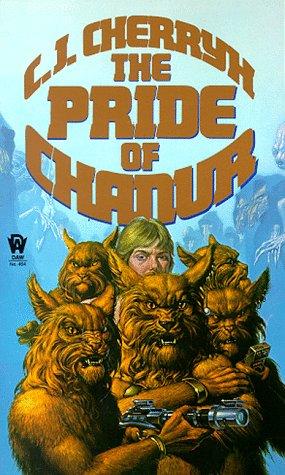Keith Stevenson (e)k C.J. Cherryh(r)en The Pride of Chanur (Alliance-Union Universe) liburuaren kritika egin du
The Pride of Chanur
5 izar
The Pride of Chanur is a first contact chase drama that’s told with breakneck pacing while also unfolding a complex and richly detailed piece of worldbuilding. In turn, the worldbuilding heightens our understanding of the stakes and tensions inherent in the action, and so it too propels the plot along.
Cherryh’s approach to worldbuilding in The Pride of Chanur (and in other books of hers I’ve reviewed like Heavy Time and Hellburner) is to let her fully-formed worlds show themselves to the reader through dialogue and action that primarily serve the plot. Her characters live in the world and work out what is happening based on that lived experience. They don’t discuss or explain things that are obvious to them, so we as readers need to keep on our toes. The characters’ understanding of the events unfolding around them is often limited due to their situation. And we don’t know …
The Pride of Chanur is a first contact chase drama that’s told with breakneck pacing while also unfolding a complex and richly detailed piece of worldbuilding. In turn, the worldbuilding heightens our understanding of the stakes and tensions inherent in the action, and so it too propels the plot along.
Cherryh’s approach to worldbuilding in The Pride of Chanur (and in other books of hers I’ve reviewed like Heavy Time and Hellburner) is to let her fully-formed worlds show themselves to the reader through dialogue and action that primarily serve the plot. Her characters live in the world and work out what is happening based on that lived experience. They don’t discuss or explain things that are obvious to them, so we as readers need to keep on our toes. The characters’ understanding of the events unfolding around them is often limited due to their situation. And we don’t know any more than they do (and usually less). They work things out and we work things out alongside them, gaining our own understanding of their fictional world from their reactions to it.
Personally I love this type of speculative fiction: the sense of vertigo you have as you enter a new world and try to come to grips with how it works. And the reward you get when you read a sentence, put two and two together and realise the implications of what you’ve just read without having to be hit over the head with it.
In Heavy Time and Hellburner, the protagonists are victims of the system they live in so they have to struggle against odds to find agency and whatever redemption they can secure. Interestingly, Chanur struck me as far more dramatic and exciting, perhaps because the protagonist, ship-captain Pyanfar Chanur, has much more agency at the beginning of the novel than those other characters.
Pyanfar runs her own business as a merchant, plying trade between the planets and systems of the Compact, a loose collection of six alien species who rub along peacefully enough because there’s more profit in that than the alternative. A lesser writer might take time to build understanding of the political situation between the species and how they function together on Meetpoint Station, but Cherryh drops us right in the action. An unknown alien runs onto Pyanfar’s ship, starving and half-crazed and bearing signs of abuse, and she gives it shelter, which in turn sparks a series of events that sees her accused of theft by the acquisitive and immoral Kif, and pursued off the station after a firefight on the loading dock.
Her ship, The Pride of Chanur, is a long way from home, and Pyanfar needs to navigate to somewhere that will at least give her a fighting chance to escape her pursuers and – if possible – gain potential allies to help in the fight. But those other alien species may or may not want to help, depending on how safe they themselves feel from the threat of Kif reprisal. And then Pyanfar finds the animal they rescued is an intelligent alien: an outsider from this part of space who calls himself a ‘human’.
Through the action we learn more about Pyanfar and her crew – all of them female Hani (cat-like and bipedal) – and about the Chanur House they belong to, the political infighting between the Hani Houses that is commonplace, and the fact that Pyanfar’s actions out in space may leave her own House open to damaging challenge. We also learn more about the human’s kidnap and torture by the Kif and the status of the other species that form the Compact. All of this plays out against a deadly game of cat and mouse between Pyanfar’s ship and the Kif following her, each move escalating the tension as innocents pay for Pyanfar’s actions and supposed allies become enemies. Nothing is ‘over-explained’. Again and again we draw our own conclusions on actions or statements based on our evolving understanding of Pyanfar’s universe. This is a novel that rewards you close attention.
The resolution is everything you could hope it would be: exciting, fast-paced, high stakes and deeply satisfying. With a hint of more to be resolved in future volumes. Highly recommended.

